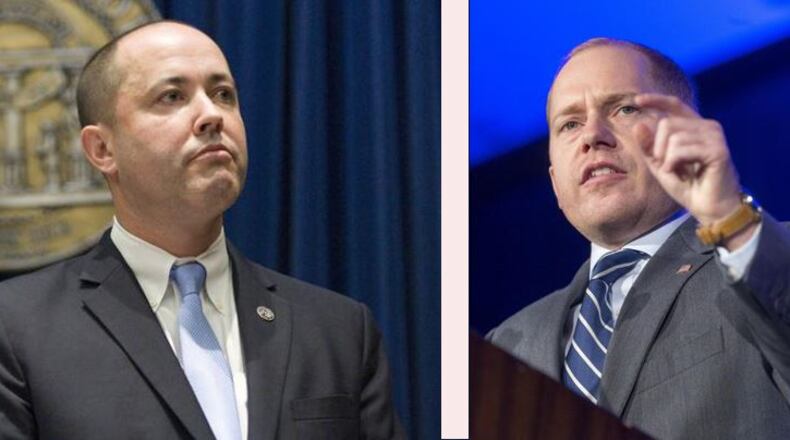In a statewide race between two unlikely candidates, an issue generally confined to the local level has taken center stage.
The Republican incumbent, Attorney General Chris Carr, and his Democrat opponent, Charlie Bailey, a former Fulton prosecutor, agree: Gangs constitute a growing threat to public safety.
There’s even a consensus on how best to deal with the problem. But the agreement ends there in a contest that’s grown increasingly bitter, with both sides raising questions about the other’s motivation, commitment, experience and effectiveness in dealing with gangs and other issues facing the state.
The race features two candidates who’ve never been elected to political office. When Sam Olens resigned in 2016, Carr, then the state’s economic development commissioner, was appointed by Gov. Nathan Deal to fill out the term. It was an unconventional choice, considering Carr, 46, hadn’t practiced law in more than a decade and has never tried a case in court.
“It’s like hiring someone to be chief of surgery at Emory who’s never been a surgeon,” said Bailey, 34. “That doesn’t make any sense.”
It’s a line of attack Bailey has repeatedly used against Carr, who said his opponent doesn’t understand the attorney general’s role.
“He (Bailey) actually thinks he’s running for district attorney,” said Carr, who compares the job to that of a managing partner of a law firm.
“It’s a little bit legal. It’s a little bit policy. It’s a little bit communications,” said the GOP nominee, formerly chief of staff to U.S. Sen. Johnny Isakson. “My experience is perfect for this job.”
Meanwhile, Carr allies have sought to use Bailey’s prosecutorial background against him.
“Atlanta’s gang problem is larger than ever and growing. And it was Charlie Bailey’s job to put them away,” one ad, paid for by the Republican Attorneys General Association, states. The ad cites limited crime stats during Bailey’s tenure in the Fulton DA’s office and blames the Democratic candidate for a rise in murders, assaults and rapes.
“To sit there having done nothing, and to then blame prosecutors … the hypocrisy astounds,” said Bailey, who headed Fulton’s gang unit before resigning earlier this year to run for attorney general. He said he first considered running for attorney general in January, one month before he announced his candidacy. That was when he first unveiled his plan to fight gangs, one he said was later mimicked by Carr, who has joined with Republican gubernatorial nominee Brian Kemp in calling for a new unit in the AG’s office devoted to fighting gang violence.
“We began the Georgia Anti-Gang Network to create an infrastructure to combat gangs working with local, state and federal law enforcement and the Prosecuting Attorneys’ Council of Georgia,” said Carr, who added he’s been advocating for additional resources to fight gangs since 2017. “You fight a network with a network.”
Bailey, in response, questioned Carr and Kemp’s commitment to fight gang violence, suggesting they’re using the issue “as a dog whistle, as a political move” to scare white voters.
“There’s no assistant AGs working on gangs,” he said. “No assistant AGs working on human trafficking. Not one indictment. What he’s done is sent out a press release and held a press conference.”
Here’s the candidates views on other issues of importance to Georgia voters:
Opioid addiction
Carr said he favors an “all-in approach,” utilizing a statewide network consisting of law enforcement agencies, prosecutors, medical professionals and treatment specialists to better coordinate an effective strategy to stem the rising tide of addiction. “There is no magic bullet. It cannot, must not fall on any individual’s shoulders. It’s too big. Everyone’s got to be at the table because everyone has a role.”
A state lawsuit against pharmaceutical companies involved in the manufacture and sale of opioids is forthcoming, he said.
Bailey said Carr has waited too long to pursue legal action against big pharma.Other states have filed their own suits seeking to collect for the cost of handling overdoses.
“When you don’t bring a suit on behalf of your state, you’re not sending a message to the pharmaceutical industry that you can’t come to your state and do that,” Bailey said. “You put us in the back of line behind other states that have been filed.”
He said he fears some of the companies targeted will have declared bankruptcy by the time Georgia’s lawsuit reaches the courts.
Healthcare
Bailey said he would withdraw Georgia from a lawsuit seeking to repeal key parts of the Affordable Care Act “on my very first day in office.”
“The most conservative estimate shows that five million people, about half the state’s population, would lose their healthcare,” if Georgia and other states joined in the suit are successful,” Bailey said. “We’re going to come in on the side of the other AGs who are standing up for their states” in seeking, for example, Medicaid expansion.
Carr said the litigation is “about the law, plain and simple.”
“What we have now is not working,” Carr said. “The cost is skyrocketing. We have to go back and do it the right way.”
He said he is optimistic “more Georgians will be covered in a constitutional way,” favoring associated healthcare plans that would extend coverage to those with pre-existing conditions.
About the Author
Keep Reading
The Latest
Featured




